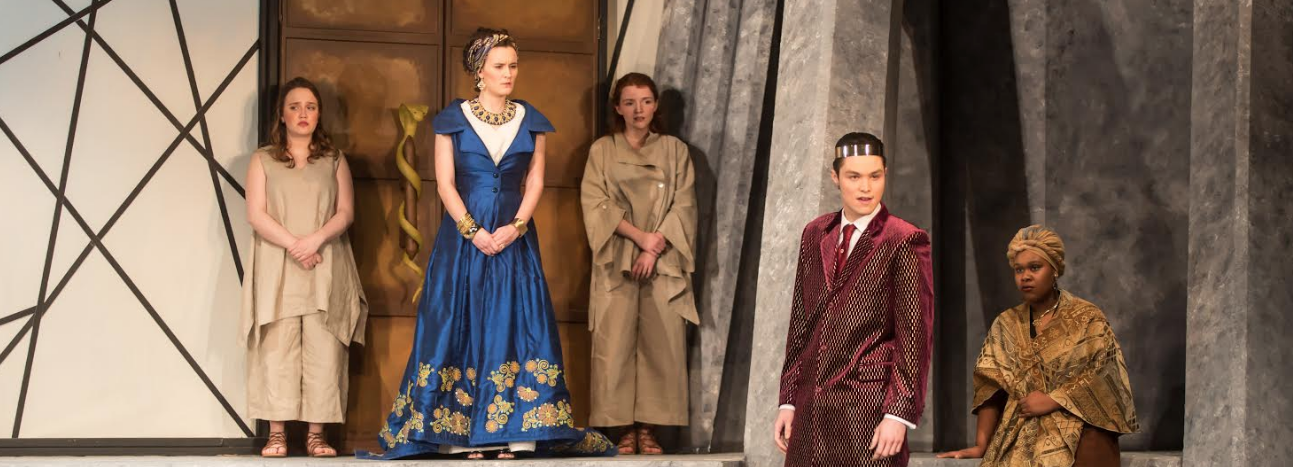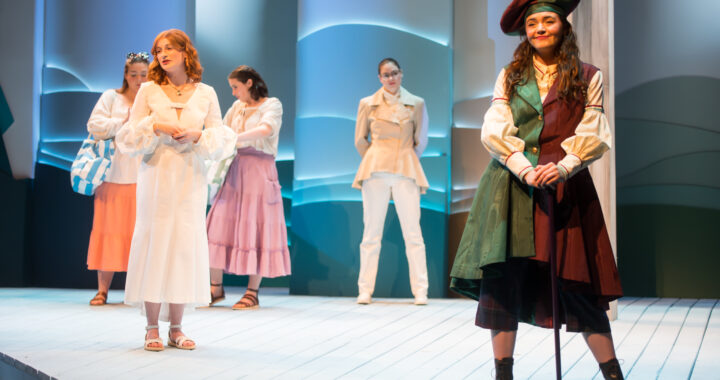UMW Theatre presents ancient Greek tragedy with “Medea”
3 min read
Geoff Greene | UMW Theatre
By LINDSEY BROWN
Senior Writer
“Hell hath no fury like a woman scorned,” a paraphrased line from William Congreve’s play “The Mourning Bride,” describes Euripides’s Greek tragedy, “Medea” so well. This story of a woman scorned has been told many times. The story of Medea is like no other; it’s a heart wrenching tale of a woman who gave everything up for a man, only for him to leave her for his own political aspirations. “Medea” is the latest UMW Theatre production in Klein Theater.
The first scene opens to a sorrowful cry from Medea offstage, as the Nurse [Elisa Davis] begins to tell the story. Her monologue begins with her wishing that certain events had not occurred at all: “For then my mistress Medea would never had seen Jason. Nor loved and saved him. Nor cut herself off from home to come with him into this country, of the smiling chattering Greeks, and the roofs of Corinth.” This scene is so powerful and moving with the Nurse’s love and worry for Medea, and it sets the tone for the entire play.
 After Medea sacrificed her title and all that she knew for her husband, Jason, she is heartbroken and enraged when he leaves her to marry the daughter of Creon, king of Corinth. Afraid that Medea will inflict her witchcraft on Corinth, Creon banishes her and her two sons, giving her only a day to prepare. With her remaining time, Medea makes a deal with Aegeus the childless king of Athens to help him have a child in exchange for refuge in Athens. The rest of Medea’s decisions unfold a story of pain and sorrow, which brought the audience to tears.
After Medea sacrificed her title and all that she knew for her husband, Jason, she is heartbroken and enraged when he leaves her to marry the daughter of Creon, king of Corinth. Afraid that Medea will inflict her witchcraft on Corinth, Creon banishes her and her two sons, giving her only a day to prepare. With her remaining time, Medea makes a deal with Aegeus the childless king of Athens to help him have a child in exchange for refuge in Athens. The rest of Medea’s decisions unfold a story of pain and sorrow, which brought the audience to tears.
Medea’s cries of agony over her pain and sorrow rang through the entire room.
Lydia Hundley [Medea] did an extraordinary job portraying this character. From the various personas she displays throughout the play, to the anger driven decisions she had to carry out, Hundley’s versatility and dedication to the role is evident.
Neil Gallini-Burdick [Jason] did a wonderful job of being a pompous jerk who believes he is justified in ruining his family. His arrogance and reactions to Medea’s anger are spot on with the facets of the character.
Alexander Rios [Creon] portrayed the mean tyrant with an evil quality that was intimidating. The Tutor [Jacob Dodges], was a kind soul, who took care of Medea’s sons, and brought a light to the stage with his positivity. Aegeus’ character [Sterling Heyns] acted as a beacon of hope for Medea and her sons. The three women who played reporters [Sarah Green, Madison Neilson, and Erin Foster] were intrusive and judgemental of Medea and Jason’s situation. The two boys, who played Medea’s sons [Leo Herrin and Aidan Caffrey] were extraordinary young actors portraying the tough roles of children caught between their parents’ wrath.
It was obvious that the director, Helen Housley, wanted each character to stand out, but at the same time Medea’s strength and anger were the most prevalent parts of the show. This powerful story was well performed, and the direction was well portrayed through each actor.
The scenic designer, Michael Benson, focused on making the set as powerful as Medea’s anger, and it is evident that the set was meant to intimidate anyone who dared to go against her. The set was made of huge columns that loomed over the actors on stage. The columns held up Medea’s home, and there were large ominous doors with lifelike snakes on the handles that add to the terror of Medea’s wrath. The size of the doors and columns set the tone for the show by portraying Medea’s strength.
The costumes, designed by Kevin McCluskey, added to the characters’ presence on stage. Medea’s costume especially, spoke volumes to her power and beauty. Her dress was a royal blue with gold accents at the bottom and a collar that gave her a royal quality. She removes the blue outer layer of the dress at one point, and has on a simple white dress beneath that gives her an air of vulnerability.
Each part of the show was as powerful as the story being told on stage. The UMW Theatre Department should be very proud of this production.
“Medea” will run from Apr. 12 to Apr. 22 in Klein Theater.











